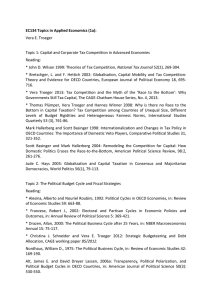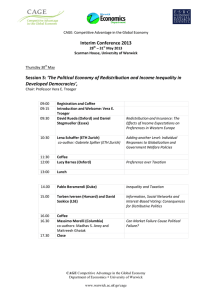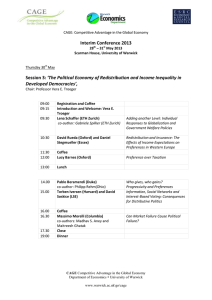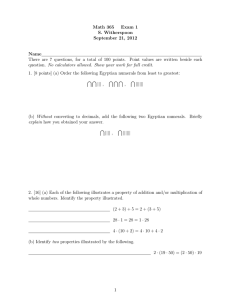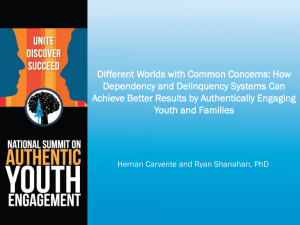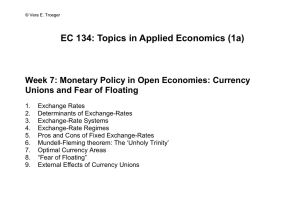EC 331: Research in Applied Economics
advertisement
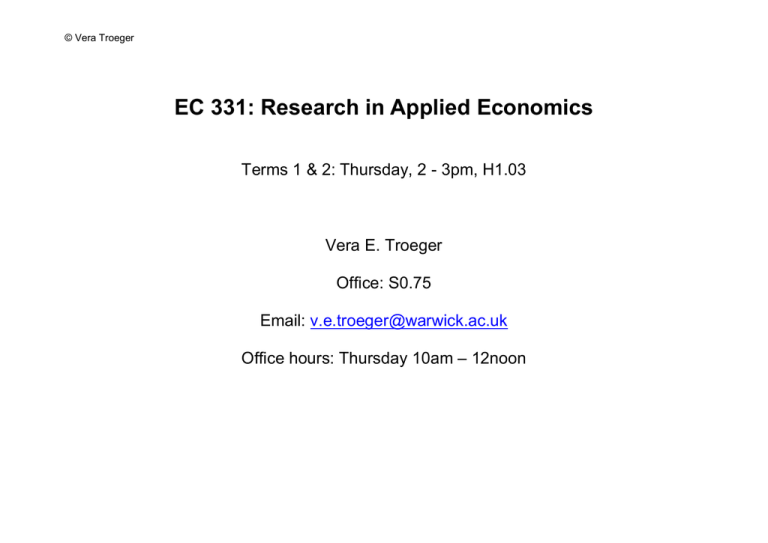
© Vera Troeger EC 331: Research in Applied Economics Terms 1 & 2: Thursday, 2 - 3pm, H1.03 Vera E. Troeger Office: S0.75 Email: v.e.troeger@warwick.ac.uk Office hours: Thursday 10am – 12noon © Vera Troeger Principal Aims To give students the opportunity to deepen and consolidate previous knowledge by applying the basic ideas of economics to the study of a particular question that interests them. In answering their research question students will be expected to use a combination of economics techniques and statistical tools. The project will often be of a statistical nature but for students whose interest lies elsewhere, for example economic history, this is not obligatory and the students will be guided in techniques that can be used to answer their question. Students are expected to attend methodological lectures and student led seminars to improve their research techniques. Students will be supervised by a member of academic staff whose research lies in a field related to their chosen topic. Principal Learning Outcomes By the end of the module the student should be able to understand how economists approach questions, in particular, how they construct hypotheses and use data to discriminate between alternate explanations for events or patterns; describe data and present it in a meaningful manner. In doing this students will gain skills in the use of computer software including statistical and/or mathematical modelling software; conduct individual research and investigate topics under their own initiative; present their research to an audience; present their research conclusions in a written form. © Vera Troeger Assessment Assessment Method: Coursework (100%) Coursework Details Project (80%) + Literature review (10%) + two class presentations (10%) Assessment 1 Weight: 10.00%, Due: Monday, December 7, 2015 Presentation 1: weeks 1 – 3, term 2 Weight: 5.00% Presentation 2 Weight: 5.00% Dissertation 1: weeks 6 – 9, term 2 Weight: 80.00%, Due: April 21, 2015 at 13:30 © Vera Troeger Assessment 1 Literature Review and Project Outline (10 %) Literature Review – 1000 words max. Project outline – 1-2 pages Submit electronically and also send to me via email. Define Research topic and research question The narrower the focus the more detailed literature review can be Critical evaluation of literature, group literature together by argument and approach, not just enumeration (A said, B said…) Original spin on RQ – new data, new cases, new specification, new variables New instruments or address econometric weaknesses Apply theory to new area/ topic © Vera Troeger Project Outline Motivation, Objective and Goals, Significance of the RQ, Argument, Hypotheses, Methodology, Data (Sources, Variables), Anticipated Problems Research Question -> what is the most general question? And, what is the most narrow and precise question that will be empirically explored in the study Empirical relevance -> Why shall we care about this question? What is it that caught your interest? What is the general problem that lies at the core of the project? Theoretical relevance -> To what bodies of the academic literature will the study contribute? How does the theoretical argument link these strands? What are the theoretical gaps that you want to address? What are the three articles / books that come closest to the planned study (competing work)? © Vera Troeger Hypotheses -> What (competing) hypotheses can you derive from the theoretical accounts outlined? Naturally, the hypotheses need to be testable empirically and shall directly answer the narrow RQ as stated under point 1. Variables -> What is the dependent variable? How can it be operationalized? -> What are the core independent variables? How will they be operationalized? -> What are potentially relevant alternative explanatory factors for which she needs to control (or which she needs to hold constant through selection of cases, respectively)? Research design -> What is the unit of analysis? Selection of cases Methodology -> What kind of data is needed? How will it be collected? i.e. what data needed for measurement of DV, what for core independent variables? -> what estimation technique is applied and why? -> What are appropriate tests? -> How will the data be analysed? How will the mechanism be established? Strategy for causal inference? © Vera Troeger Empirical expectation -> What do you expect to find, and why? Challenges -> What challenges do you anticipate? -> What problems in the econometric analysis do you anticipate? Data availability, endogeneity, heterogeneity, time dependence? © Vera Troeger Assessment 2 Data presentation 5% Presentation term 2 weeks 1-3, please sign up! 10 minutes, 6 slides max. (send to me the day before presentation!) Data acquisition over Christmas! Present the data, descriptive statistics, graphical representation How will you use the data to test hypotheses? © Vera Troeger Assessment 3 Final Presentation 5% Term 2, weeks 6 – 9, sign up! 12 – 15 minutes, 8 slides max. (send to me, 1 day before presentation!) Presentation should give an overview over the whole project RQ, literature, argument, hypotheses, RD, data, methodology, findings (along the points outlined above)
